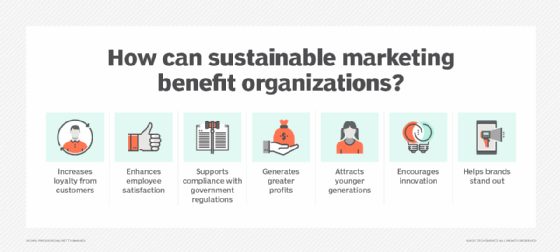
Getty Images
Why is sustainable marketing important?
Sustainable marketing is important because it raises awareness of environmental and social issues. On a business level, it can improve brand loyalty and worker engagement.
Organizations that practice sustainable marketing can help the world and their businesses at the same time.
In the past, organizations only had to offer low prices and quality products to satisfy many customers. However, as people have become more passionate about climate change and social issues, they increasingly want to support organizations that share their values. Many investors prefer to fund organizations that engage in sustainable business practices, as they typically offer high market returns and show resilience amid economic downturns. Additionally, these organizations are more likely to achieve compliance with environmental and social regulations.
To compete in this environmentally and socially conscious landscape, many organizations engage in sustainable marketing. This approach requires organizations to invest in sustainability initiatives. However, it can increase brand loyalty, enhance employee engagement, support regulatory compliance and boost profits.
What is sustainable marketing and why is it important?
Sustainable marketing is the promotion of brands and products based on their perceived positive effects on the environment and society. For instance, an organization might promote its use of recyclable packaging or its ethical sourcing practices.
This approach helps organizations connect and build trust with a growing base of environmentally and socially conscious consumers. It also encourages brands to adopt responsible business practices that can support long-term value for their stakeholders and the planet.
7 benefits of sustainable marketing
As sustainable marketing improves how organizations relate to the environment and their stakeholders, it can increase brand loyalty, improve employee satisfaction and increase profits.
1. Increases brand loyalty
Organizations that honestly engage in sustainable marketing can build brand loyalty with environmentally and socially conscious consumers. Brand loyalty is a commitment to a brand based on its perceived trustworthiness and values. If organizations successfully link their brand image to a larger environmental or social mission, such as the fight against climate change or discrimination, they could increase customer retention rates.
Customers who show loyalty to brands often make frequent purchases, even if competitors offer lower prices. Repeat business costs organizations less in advertising than new customer acquisition and can drive a significant portion of revenue.
2. Improves employee engagement
Just as consumers want to spend money with brands that share their values, employees want to feel like the work they do has a positive effect. Honest sustainable marketing requires organizations to improve their environmental, social and governance (ESG) practices, which can make employees more engaged in their work. Employees who value sustainability may feel a sense of fulfillment if they work for organizations that prioritize ESG.
Organizations can also implement social sustainability policies -- the social aspect of ESG -- to improve employees' daily lives. For example, an organization may implement a flexible paid time-off policy to prioritize employee work-life balance over short-term profit. This type of social sustainability policy can improve employee satisfaction, reduce turnover and attract top talent.

3. Supports regulatory compliance
To launch effective sustainable marketing campaigns, business leaders should address their organizations' environmental and social effects. For instance, an organization can reduce its greenhouse gas emissions and voluntarily disclose its emission levels as part of its sustainability strategy. These practices can help organizations comply with a growing number of ESG regulations.
For example, in January 2023, the EU finalized the Corporate Sustainability Reporting Directive, which expanded the number of organizations required to publicly disclose their ESG data.
Sustainable marketing encourages organizations to improve their environmental and social business practices, which can help them comply with current and potentially future regulations.
4. Increases profits
In the past, many business leaders viewed sustainability initiatives as constraints to success because they can require costly upfront investments. However, sustainable practices can increase organizations' profits. For instance, a sustainable marketing campaign may center around an organization's reduction in energy and water consumption. As organizations implement more energy-efficient technologies, appliances and processes, they can reduce operational costs.
Investors also use ESG ratings, which gauge organizations' long-term exposure to environmental and social risks, to identify profitable investments. Organizations with high ESG ratings may receive more funding from investors than others, which can create opportunities for growth and lead to increased profits.
If organizations embrace sustainable marketing strategies, they can become more competitive in their markets. However, if they knowingly or unknowingly make false claims about their sustainability initiatives -- a practice known as greenwashing -- their campaigns can backfire. Before organizations launch sustainable marketing campaigns, they can meet with sustainability consultants to learn how to implement effective ESG initiatives.
5. Attracts new customer segments
Organizations can implement sustainability initiatives and marketing campaigns to appeal to more customer segments, including Generation Z and millennials. These generations were exposed to more sustainability awareness content in school and the media than previous generations. Therefore, they tend to prefer brands that protect the environment and support social causes.
Additionally, many governments prefer to work with contractors who follow sustainable practices, which can open more business opportunities for eco-friendly organizations.
6. Increases innovation
As sustainability becomes a core brand value, R&D teams face pressure to use fewer resources and reduce greenhouse gas emissions and waste. This pressure can push brands to rethink how they produce and deliver their products.
For instance, a retailer might invest in biodegradable packaging to reduce its environmental footprint but, in the process, find new ways to reduce production and shipping costs. These innovations can enhance efficiency and simultaneously attract environmentally conscious consumers.
7. Differentiates from competition
Markets have become increasingly crowded due to low barriers to entry and globalization. This means consumers have many brands to choose from for most products. However, sustainable marketing can help organizations differentiate themselves from competitors that sell similar products and services.
For example, supermarkets often carry dozens of ice cream brands, including Ben & Jerry's. However, Ben & Jerry's stands out to many consumers due to its strong stances on climate change and fair trade sourcing.
The evolution of sustainable marketing
Sustainable marketing evolved from green marketing, a type of marketing that focuses mostly on the environment.
Green marketing took shape in the 1970s as the Industrial Revolution's environmental effects became increasingly apparent. Governments had few environmental regulations in the 1960s, so air and waterway pollution increased. As a result, the U.S. and EU implemented major environmental regulations in the early 1970s to incentivize more responsible business practices. Some organizations adopted green marketing strategies in this period to build trust with environmentally conscious consumers, although many business leaders viewed it as a fringe practice.
People grew more interested in climate issues in the 1990s due to the topic's increased media coverage. As a result, green marketing saw a small uptick in interest. Some organizations created green marketing campaigns around recycling efforts and energy-efficient products. However, most organizations still saw environmental protection and green marketing as optional and costly endeavors.
Then, between 2004 and 2008, the United Nations released a series of reports that called for governments, investors and financial analysts to more strongly focus on organizations' ESG practices. Subsequently, many organizations created ESG initiatives and began sustainable marketing initiatives. Since the mid-2000s, consumers have become increasingly aware of environmental and social issues, and sustainable marketing has become a more common business practice.
Editor's note: This article was originally published in 2023. It was updated and expanded to improve readability and reflect changes in the global regulatory landscape.
Tim Murphy is site editor for Informa TechTarget's SearchCustomerExperience and SearchContentManagement sites.






